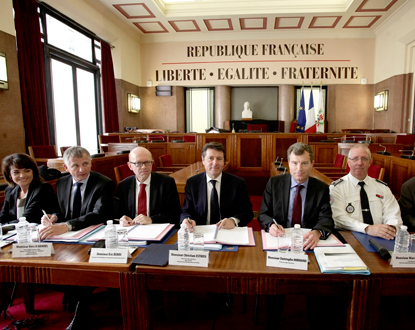In the presence of public stakeholders partnering with the Local Security and Crime Prevention Council, Christophe Mirmand, Prefect of Alpes-Maritimes, Christian Estrosi, Mayor of Nice and President of the CLSPD, Benoit Kandel, representative of Eric Ciotti, President of the General Council of Alpes-Maritimes, and Eric Bedos, Prosecutor of the Republic, signed this Monday the new “innovative and partnership-based” text of the Territorial Security and Crime Prevention Strategy for the next three years.
The Territorial Security and Crime Prevention Strategy replaces the Local Security Contract. Comprising 3 axes, 10 operational objectives, and 2 innovations for greater reactivity and efficiency, this strategy, approved by the city council and established in partnership between the City of Nice, the State, the department, and various local operators (landlords, transporters, etc.) brings together all partners around shared issues.
Security is a major societal issue, heightened in public perception by the dissemination of information that connects and amplifies every negative event.
But how can we ensure security—which is, above all, a right of the weakest and most disadvantaged—without encroaching on the liberties of everyone, particularly those who are less strong?
How do we link prevention to repression, making the former the cornerstone of education in civic values and duties, and the latter a tool for rehabilitation rather than merely a means of punishment, simple retribution by society against the offender?
The answer is easy: there are no miracle solutions or ready-made recipes.
There is only the capacity and willingness to implement a set of complementary options, the capability to work as a team instead of seeking individual gain.
Most importantly, there is a method: to try to understand the origins of crimes and their perpetrators’ behavior, to make doubt a strength rather than a weakness, to view indicators as measures rather than end results, and to recognize that solutions come with time.
And, ultimately, to cooperate with one another towards a common goal.
Apparently, this is how things are done in Nice, and everyone wants to acknowledge this: The mayor, responsible for local crime prevention policies, the State, and particularly the national police, guarantee security and public order. Responsibilities and resources to achieve these goals are fully shared.
The State in its various representations, as well as the General Council and the Judiciary, have demonstrated genuine cooperation in driving actions.
The overall assessment of the CLS is favorable. The results achieved meet the assigned objectives. The orientations developed and signed in 2009 have led to concrete and measurable actions.
The priority areas that were set, on the one hand, for strengthening prevention towards both perpetrators and victims, and on the other, for improving public tranquility, have been achieved (over 80%) in accordance with the commitments made in the CLS. Numerous actions have been very positive.
In the future, the strategy will necessarily be partnership-based with the State, the department, and local operators, and will enable the mobilization of all partners around shared concerns.
The envisaged perspectives will result from the improvement of work paths defined by mutual agreement.


